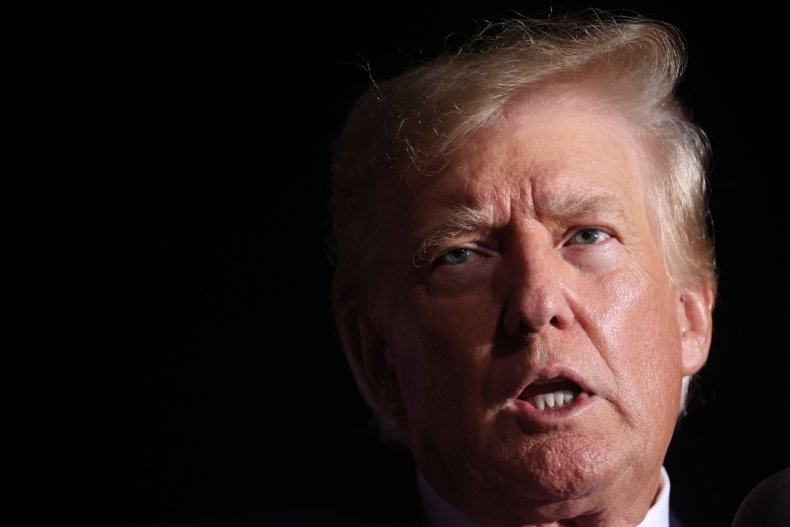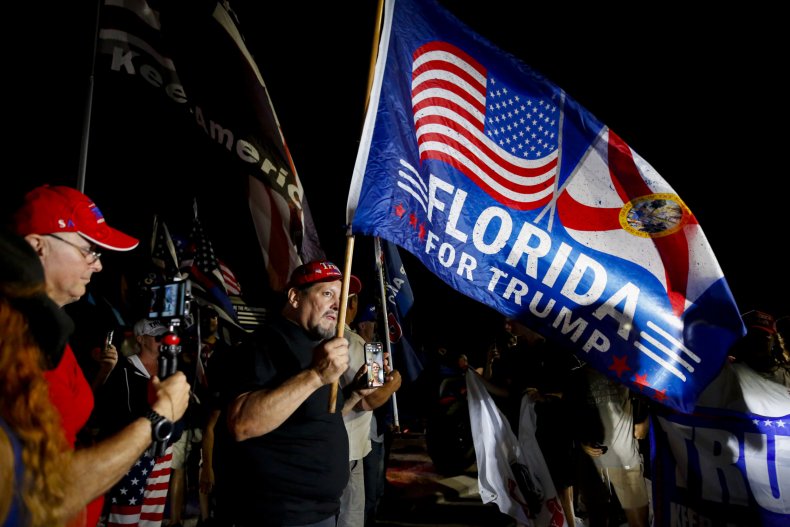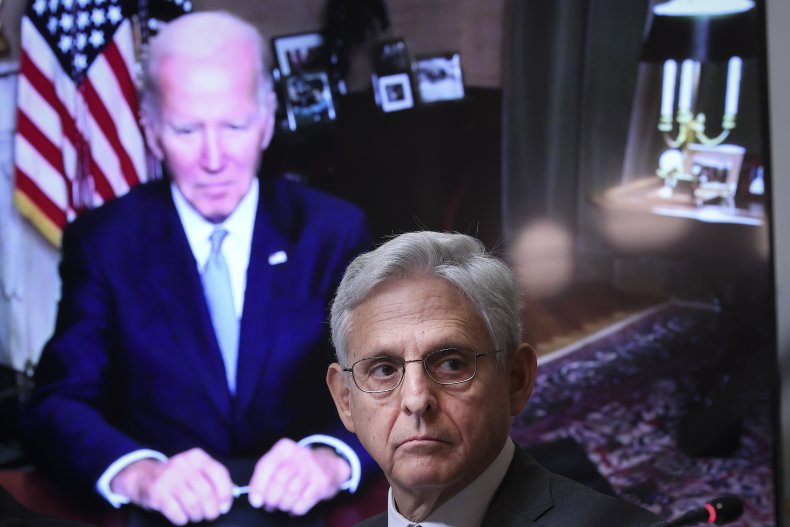The raid on Mar-a-Lago was based largely on information from an FBI confidential human source, one who was able to identify what classified documents former President Trump was still hiding and even the location of those documents, two senior government officials told Newsweek.
The officials, who have direct knowledge of the FBI's deliberations and were granted anonymity in order to discuss sensitive matters, said the raid of Donald Trump's Florida residence was deliberately timed to occur when the former president was away.

FBI decision-makers in Washington and Miami thought that denying the former president a photo opportunity or a platform from which to grandstand (or to attempt to thwart the raid) would lower the profile of the event, says one of the sources, a senior Justice Department official who is a 30-year veteran of the FBI.
The effort to keep the raid low-key failed: instead, it prompted a furious response from GOP leaders and Trump supporters. "What a spectacular backfire," says the Justice official.
"I know that there is much speculation out there that this is political persecution, but it is really the best and the worst of the bureaucracy in action," the official says. "They wanted to punctuate the fact that this was a routine law enforcement action, stripped of any political overtones, and yet [they] got exactly the opposite."
Both senior government officials say the raid was scheduled with no political motive, the FBI solely intent on recovering highly classified documents that were illegally removed from the White House. Preparations to conduct such an operation began weeks ago, but in planning the date and time, the FBI Miami Field Office and Washington headquarters were focused on the former president's scheduled return to Florida from his residences in New York and New Jersey.
"They were seeking to avoid any media circus," says the second source, a senior intelligence official who was briefed on the investigation and the operation. "So even though everything made sense bureaucratically and the FBI feared that the documents might be destroyed, they also created the very firestorm they sought to avoid, in ignoring the fallout."

On Monday at about 10 a.m. EST, two dozen FBI agents and technicians showed up at Donald Trump's Florida home to execute a search warrant to obtain any government-owned documents that might be in the possession of Trump but are required to be delivered to the Archives under the provisions of the 1978 Presidential Records Act. (In response to the Hillary Clinton email scandal, Trump himself signed a law in 2018 that made it a felony to remove and retain classified documents.)
The act establishes that presidential records are the property of the U.S. government and not a president's private property. Put in place after Watergate to avoid the abuses of the Nixon administration, the law imposes strict penalties for failure to comply. "Whoever, having the custody of any such record, proceeding, map, book, document, paper, or other thing, willfully and unlawfully conceals, removes, mutilates, obliterates, falsifies, or destroys the same, shall be fined" $2,000, up to three years in prison or "shall forfeit his office and be disqualified from holding any office under the United States."
The act, and concerns about the illegal possession of classified "national defense information" are the bases for the search warrant, according to the two sources. The raid had nothing to do with the January 6 investigation or any other alleged wrongdoing by the former president.
The road to the raid began a year-and-a-half ago, when in the transition from the Trump administration to that of President Joe Biden, there were immediate questions raised by the National Archives and Records Administration (NARA) as to whether the presidential records turned over to the federal agency for historical preservation were complete or not.
In February, Archivist David Ferriero testified before Congress that his agency began talking with Trump's people right after they left office and that the Trump camp had already returned 15 boxes of documents to the Archives. Ferriero said that in those materials, the Archives discovered items "marked as classified national security information," unleashing further inquiries as to whether Trump continued to possess classified material.
The basic outlines of the facts surrounding this timeline have been confirmed by the former president. He has previously said that he was returning any official records to the Archives, labeling any confusion in the matter as "an ordinary and routine process to ensure the preservation of my legacy and in accordance with the Presidential Records Act." He also claimed the Archives "did not 'find' anything" in what he had already been returned, suggesting that there was nothing sensitive. He said the documents had inadvertently shipped to Florida during the six-hour transition period in which his belongings were moved.
According to the Justice Department source, the Archives saw things differently, believing that the former White House was stonewalling and continued to possess unauthorized material. Earlier this year, they asked the Justice Department to investigate.
In late April, the source says, a federal grand jury began deliberating whether there was a violation of the Presidential Records Act or whether President Trump unlawfully possessed national security information. Through the grand jury process, the National Archives provided federal prosecutors with copies of the documents received from former President Trump in January 2022. The grand jury concluded that there had been a violation of the law, according to the Justice Department source.
In the past week, the prosecutor in the case and local Assistant U.S. Attorney went to Florida magistrate Judge Bruce Reinhart in West Palm Beach to seek approval for the search of Donald Trump's private residence. The affidavit to obtain the search warrant, the intelligence source says, contained abundant and persuasive detail that Trump continued to possess the relevant records in violation of federal law, and that investigators had sufficient information to prove that those records were located at Mar-a-Lago—including the detail that they were contained in a specific safe in a specific room.
"In order for the investigators to convince the Florida judge to approve such an unprecedented raid, the information had to be solid, which the FBI claimed," says the intelligence source.
According to experts familiar with FBI practices, Judge Reinhart reviewed the prosecutor's evidence and asked numerous questions about the sources and the urgency. The judge signed a search warrant allowing the FBI to look for relevant material and the FBI then planned the operation, wanting to conduct the raid while Trump was spending time at his golf club in Bedminster, New Jersey. A Secret Service source who spoke on background said the Secret Service director was given advance warning and was later told the specifics of the raid.
Because the Secret Service is still responsible for protecting the former president, his family, and his property, the FBI had to coordinate with the Secret Service to gain access to the grounds.
A convoy of unmarked black SUVs and a Ryder rental truck filled with about three dozen FBI special agents and technicians entered the gates in the early evening. Heavily armed Secret Service agents were also visibly present at the gates. The Palm Beach Police Department was also present at the scene.
The entire operation was conducted relatively stealthily. No FBI people were seen in their iconic blue windbreakers announcing the presence of the Bureau. And though local law enforcement was present, the Palm Beach Police Department was careful to tweet on Tuesday that it "was not aware of the existence of a search warrant nor did our department assist the FBI in the execution of a search warrant."
According to news reports, some 10-15 boxes of documents were removed from the premises. Donald Trump said in a statement that the FBI opened his personal safe as part of their search. Trump attorney Lindsey Halligan, who was present during the multi-hour search, says that the FBI targeted three rooms—a bedroom, an office and a storage room. That suggests that the FBI knew specifically where to look.
"This unannounced raid on my home was not necessary or appropriate," former President Trump said in a statement. He called the raid "prosecutorial misconduct, the weaponization of the Justice System, and an attack by Radical Left Democrats who desperately don't want me to run for President in 2024."
Though Trump and his Republican Party allies are portraying the raid as politically motivated, it is likely the unprecedented nature of the raid on the property of a former president will have the greatest reverberation. Even Trump's political rivals have rallied in condemning the FBI.
Former Vice President Mike Pence tweeted that "no former President of the United States has ever been subject to a raid of their personal residence in American history." Mike Pompeo, Trump's Secretary of State and CIA director, tweeted that Attorney General Merrick Garland "must explain why 250 yrs of practice was upended w/ this raid. I served on Benghazi Com[mittee] where we proved Hillary possessed classified info. We didn't raid her home."
The Biden White House says the president was not briefed about the Mar-a-Lago raid and knew nothing about it in advance. "The Justice Department conducts investigations independently and we leave any law enforcement matters to them," Press Secretary Karine Jean-Pierre said Tuesday afternoon. "It would not be appropriate for us to comment on any ongoing investigations."

The senior Justice Department source says that Garland was regularly briefed on the Records Act investigation, and that he knew about the grand jury and what material federal prosecutors were seeking. He insists, though, that Garland had no prior knowledge of the date and time of the specific raid, nor was he asked to approve it. "I know it's hard for people to believe," says the official, "but this was a matter for the U.S. Attorney and the FBI."
FBI director Christopher Wray ultimately gave his go-ahead to conduct the raid, the senior Justice official says. "It really is a case of the Bureau misreading the impact."
"news" - Google News
August 10, 2022 at 09:03PM
https://ift.tt/EWMGnk9
Exclusive: An Informer Told the FBI What Docs Trump Was Hiding, and Where - Newsweek
"news" - Google News
https://ift.tt/sOHbXPJ
https://ift.tt/p38Kt2l
Bagikan Berita Ini














0 Response to "Exclusive: An Informer Told the FBI What Docs Trump Was Hiding, and Where - Newsweek"
Post a Comment